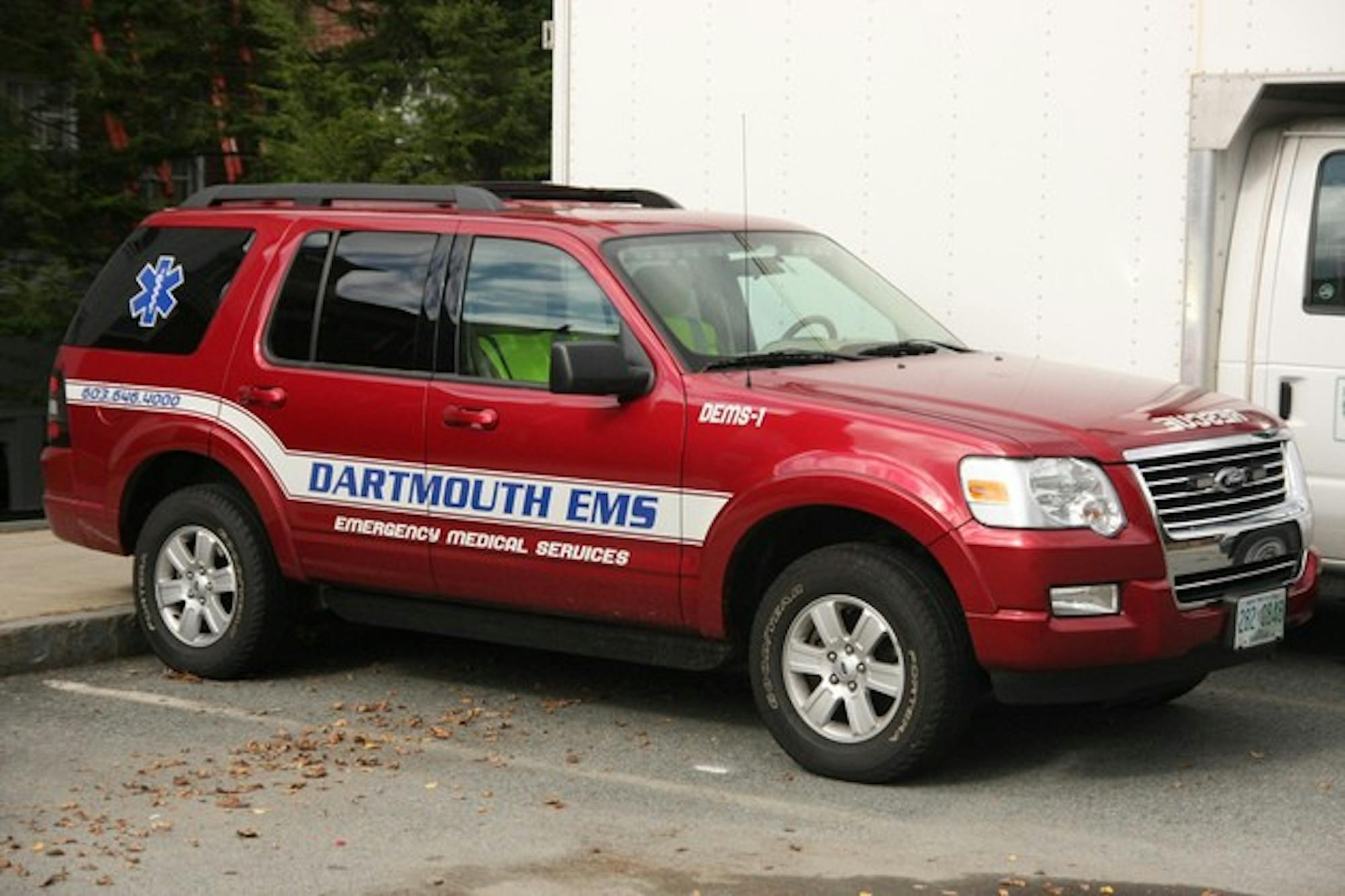Although the group is open to everyone and there are no membership requirements, students must complete certain basic training sessions, including CPR and First Aid, to sign up for on-call shifts, assistant director Adam Strom '10 said.
When Safety and Security receives a Good Sam or medical emergency call on the weekend, Dartmouth EMS students respond alongside the officers.
Two trained Emergency Medical Technicians and a tertiary responder are on-call for each eight-hour shift. The tertiary responder is usually a student involved in the organization who has not completed EMT training, Spielberg said.
"It's really cool that we have this whole student-run organization to provide medical care and that it provides a friendly interface between [Safety and Security] and the student body," Rosemary Shay '13, a tertiary who will complete EMT training next week, said.
There are 12 to 15 active EMTs and 22 to 25 active tertiaries in the organization, Spielberg said.
Last year, 41 percent of recorded calls were related to alcohol, according to Spielberg. Other incidents to which EMS have responded included sports injuries, cardiac arrest, respiratory emergencies and head injuries, Strom said.
Major weekends such as Homecoming, Winter Carnival and Green Key force a change from routine, as Dartmouth EMS expands its on-call hours. During these weekends, the group uses Dick's House as its centralized base, helping to watch patients and increasing the facility's capacity, Spielberg said.
EMS members interviewed by The Dartmouth said that caring for the health of students is an empowering experience.
"I really like how EMS fits into the broader health care system at Dartmouth," EMT August Oddleifson '13 said. "It's an integral part of the harm reduction and alcohol management policies here."
Most student patients are cooperative and grateful for the medical services provided by EMS students, Strom said. Several have sent him thank-you e-mails after receiving medical help.
The small size of Dartmouth's campus can make treating students "a little weird," Shay said, because she sometimes has a personal connection to the student needing treatment, but Dartmouth EMS has strict confidentiality policies and professional standards, she said.
"When you have a patient, they're a patient and that's all there is to it, so it's not really that much of a problem," she said.
Students with EMS do not discuss cases with anyone because of patient confidentiality rules, Oddliefson said.
"That confidentiality is vital for the whole organization to function," he said. "It's a trust that students know what they're doing and those students won't tell anyone anything."
Having students providing medical care can be beneficial because injured, ill or intoxicated students are not dealing with "the man" or "the institution" but instead with peers, Oddleifson said. "We can take a look at any situation whether it be an injury or an illness or an intoxication and advocate for what's in a student's best interest medically," Spielberg said. "I think that's something important that we as students can do for our peers."
Dartmouth EMS was founded in 1991 by Bryce Friedman '94, who was interested in having students trained as emergency first responders. At the time, the College general counsel issued a cease-and-desist order prohibiting Friedman from using the Dartmouth name in connection with the newly formed EMS group, Spielberg said.
The organization's relationship with the College has since improved significantly, Spielberg said.
In 1999, Dartmouth EMS was licensed by the state of New Hampshire, allowing members to provide medical care in addition to receiving training.
Dartmouth EMS has "great working relationships" with Safety and Security, the College's Health Services and Hanover Police, Spielberg said.
"I don't know any other students on this campus that, on the average Friday or Saturday night, will stop on the street and chat with the cops, say hi to the Fire Department," he said. "That's kind of cool because you're crossing over boundaries that usually exist in Hanover."
The scope of Dartmouth EMS's coverage has expanded significantly since Spielberg and Strom were freshmen, they said. After presenting administrators and health care providers at the College with a proposed on-campus response model, the group began providing on-call coverage over Homecoming Weekend of 2007, according to Spielberg.
Later that year, they were equipped with radios, and now Dartmouth EMS leases an emergency vehicle from the College, Strom said.
The members of Dartmouth EMS are currently considering expanding their on-call hours, Spielberg said.
In addition to the four eight-hour on-call shifts every weekend, Dartmouth EMS teaches CPR/First Aid courses open to students and community members approximately once a week. Many leaders of Dartmouth Outing Club First-Year Trips receive their required CPR/First Aid training through EMS classes, according to Spielberg.
Dartmouth EMS not only teaches participants emergency medical care skills, but also serves as a way to make friends, perform community outreach and help other students, EMS tertiary responder Nick Valentini '13 said.
"There's something beyond just showing up to a Good Sam call or showing up to a trauma call," he said.




